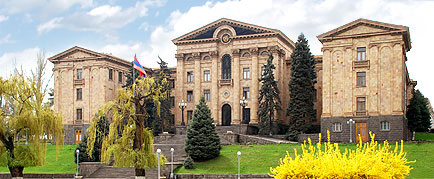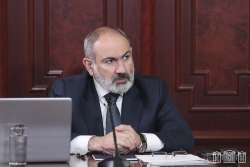On June 27, the sitting of the NA Inquiry Committee created for Studying the Circumstances of the Hostilities Unleashed on September 27, 2020 continued.
The Committee Chair Andranik Kocharyan informed that besides the deputies and experts representatives of extra-parliamentary forces take part in the work of the NA Inquiry Committee, as well as the parents of the missing and fallen servicemen. According to him, as the representatives of the NA opposition factions decided not to take part in the sitting, the Committee set up a working group, which after the first meeting with the RA Prime Minister collected the voiced questions and viewpoints of the opposition colleagues.
“Speaking about the procedure of the negotiation process presented by you did not touch upon the inter-connection of the negotiating deteriorating and the inner-political processes of the Republic of Armenia, the factors affecting on weakening our positions in the negotiation process. In particular, haven’t the demographic, economic, scientific-educational indices of the country affected on that process? We should speak in the same way also about the international situation and geo-political processes, which independently affected on the negotiation process. The Russian Federation-Turkey relations, which were manifested in Syria and else, the Russian-Ukrainian conflict of 2014, etc. are especially important,” Andranik Kocharyan read the question prepared by the working group.
Nikol Pashinyan noted that in his previous speech he referred to that broad question. “You know that there is such hypothesis are also public that, for example, the events of the same 1999 – October 27, has a connection with the negotiation process, particularly with that concept of exchange of territories. This is a hypothesis that, in fact, until now in legal, criminal-legal aspect is not proved or substantiated, but it is not excluded that it can be a matter of discussion.
The next problem you mentioned the economic and demographic factors. You see to what circumstance I would like to draw your attention. In 1994, when ceasefire was established, basically, it was recorded that the Armenian side won in the war, and the Azerbaijani side – lost. After that, during 20 years, the population of Azerbaijan, basically, almost doubled, and the population of Armenia essentially decreased. Here very important problem is laid down between the victory and the human relation, but which I am not sure, is a matter of discussion in this format,” Nikol Pashinyan said and asked a question why as a result of that victory, the population of the Republic of Armenia did not increase, but decreased? Why, as result of that victory, Armenia could not win Azerbaijan in the economic competition. According to the Prime Minister, it is a direct connection with security and military budgets and other realities.
Regarding the inner-political issues, NIkol Pashinyan noted that in 1997-1998 the negotiation process of the Nagorno Karabakh issue settlement and the Nagorno Karabakh issue had an inner-political very essential impact at least in formal viewpoint. “You know, Levon Ter-Petrosyan gave reasons in the conceptual differences around Nagorno Karabakh. I will say that the issue is voluminous, in order to answer briefly. If in short, then this much,” Nikol Pashinyan mentioned summing up.
The Deputy Chair of the Standing Committee on Defense and Security Armen Khachatryan inquired if it was impossible to stop the conveyor leading to war.
“No, I don’t think so, if we should not refuse the vision of Nagorno Karabakh being out of Azerbaijan. At that moment, we deny the vision of seeing Nagorno Karabakh out of Azerbaijan and we would go in a way that, of course, does not guarantee that it would be possible avoid war,” the RA Prime Minister said, reflecting upon the besides the war conveyer also ‘the war crossroads.” “The war crossroads followed the one line-conveyor of war with negotiation content. One of the war crossroads are the specifications connected with the Lachin Corridor, which, basically were not specified in Kazan, in future, were less specified. Here should certain discussion,” Nikol Pashinyan underscored. According to him, the next crossroads of the war are the possible processes of the involvement of the Armenian and Azerbaijani communities of Nagrono Karabakh, delimitation and demarcation.
The next question addressed to the Prime Minister referred to the mutual trust of military-political of Armenia and Artsakh during war. According to Andranik Kocharyan, there were various talk on serious disagreements: different kinds of information were coming from the political authorities of Artsakh about front, the information of the Armed Forces and the General Headquarters of the Republic of Armenia in many cases do not correspond with the information passed by the power of Artsakh.
“During the war and after it, I don’t remember any disagreements and misunderstandings with the political leadership of Nagorno Karabakh,” the RA Prime Minister underlined, adding. “The President of Nagorno Karanakh gave me information about the military situation in this or that part, which after checking with the Ministry of Defense and the General Headquarters, in the overwhelming majority of cases, I received a denial of the information given by the President of Nagorno Karabakh. However, at the same time, in most cases, after one or two days, the General Headquarters had to confirm this information.” the RA Prime Minister considered the reliability of the reports to be the biggest problem.
The Chairman of the Sovereign Armenia party Davit Sanasaryan inquired whether the Prime Minister had mastered the negotiation process in 2019 in the scope that he presented to the Inquiry Committee, that is, whether it was clear to him where the negotiations were going. Nikol Pashinyan mentioned that in 2019, he called this negotiation process at the working level a “conveyor” of war, because the logic is the following: give me what I want through peace and negotiations, otherwise I will get the same through war. “My task was to try to understand what factors could stop this conveyor.” Yes, I admit that I could not stop that “conveyor , ” the Prime Minister said.
Was the question of changing the foreign political vector discussed before the 44-day war? In response, Nikol Pashinyan informed that such a question was not discussed. “On the contrary, our perception was that the change in the foreign political vector could have very serious consequences, first of all, in the context of the Nagorno Karabakh conflict,” the Prime Minister added.
Talking about the ways to prevent the war, the Prime Minister Nikol Pashinyan touched upon diplomatic flexibility, highlighted the importance of the 2007-2016 diplomatic process, noting that it led to a war that began and de jure did not end.
The RA Prime Minister noted that a legitimate accusation may be made against him, as to why he did not make the statements made during the 2022 press conference earlier, for example, in May 2019. “Yes, not making those statements had consequences. The problem is, what would be the results and consequences of making statements , ” the RA Prime Minister noted.
In response to the question about the culprits during the military operations, the Prime Minister documented that there are criminal cases, the accused, and the court will make a decision about their behavio u r.
A question was also raised about having the autonomy of Nagorno Karabakh as part of Azerbaijan. Nikol Pashinyan mention ed that by saying Nagorno Karabakh, the international community has always meant a territory where Armenians and Azerbaijanis live, who have autonomy. Nikol Pashinyan reaffirmed that this issue was never bypassed in any negotiation logic.
Nikol Pashinyan detailed the 2020 July events, presented episodes from his conversations with officials, his wife Anna Hakobyan’s stay in Artsakh during the war, his son Ashot Pashinyan’s participation in military operations, and a number of other issues of interest to the Committee.
In addition to the unified questionnaire, the participants of the sitting also asked the Prime Minister other questions regarding the armament of the army, the military budget, the process of fulfilling bilateral obligations under the Trilateral Statement of November 9, the internal political processes following the trilateral statement, the activities of the opposition, and the phases of negotiations.
At the previous sitting of the Inquiry Committee, the opposition figures responded to the Prime Minister's speech on various platforms. The deputy Vahagn Aleksanyan presented those reactions in the format of questions. The RA Prime Minister presented extensive clarifications regarding all issues.
The re maining part of the sitting was held behind the closed doors.




 27.06.2023
27.06.2023 27.06.2023
27.06.2023 27.06.2023
27.06.2023
